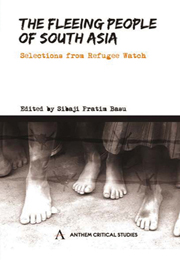Book contents
- Frontmatter
- Contents
- Acronyms and Abbreviations
- Foreword by Ranabir Samaddar
- Preface
- ETHICAL ISSUES
- Introduction
- Ethical Origins of Refugee Rights and Humanitarian Law
- Power, Fear, Ethics
- Victim's Right to Communicate
- The Guiding Principles: Normative Status and its Effective Domestic Implementation
- The Boundaries of Belonging: Reflections on Migration Policies in the Twenty-First Century
- LAWS
- SOUTH ASIA
- INDIA
- GENDER
- INTERVIEW/CORRESPONDENCE
- REPRESENTATIONS
- Index
Ethical Origins of Refugee Rights and Humanitarian Law
from ETHICAL ISSUES
Published online by Cambridge University Press: 05 March 2012
- Frontmatter
- Contents
- Acronyms and Abbreviations
- Foreword by Ranabir Samaddar
- Preface
- ETHICAL ISSUES
- Introduction
- Ethical Origins of Refugee Rights and Humanitarian Law
- Power, Fear, Ethics
- Victim's Right to Communicate
- The Guiding Principles: Normative Status and its Effective Domestic Implementation
- The Boundaries of Belonging: Reflections on Migration Policies in the Twenty-First Century
- LAWS
- SOUTH ASIA
- INDIA
- GENDER
- INTERVIEW/CORRESPONDENCE
- REPRESENTATIONS
- Index
Summary
REFUGEES
The term ‘refugee’ is a term of art, i. e. a term with a content, verifiable according to principles of general international law. In ordinary usage, it has a broader, looser meaning, signifying someone in flight, who seeks to escape conditions or personal circumstances found to be intolerable. The destination is not relevant; the flight is to freedom, to safety. Likewise, the reasons for flight may be many – flight from oppression, from a threat to life or liberty, flight from prosecution; flight from deprivation, from grinding poverty; flight from war or civil strife; flight from natural disasters – earthquakes, flood, drought and famine. Implicit in the ordinary meaning of the word ‘refugee’ lies an assumption that the person concerned is worthy of being, and ought to be, assisted, and, if necessary, protected from the causes and consequences of flight. The ‘fugitive’ from justice, the person fleeing criminal prosecution for breach of the law in its ordinary and non-political aspect, is therefore often exempted from this category of refugees.
For the purposes of international law, states have further limited the concept of the refugee. For example, ‘economic refugees’ – the term is generally disfavoured – are not included. The solution to their problem, perhaps, lies more within the province of international aid and development, rather than in the institution of asylum, considered as protection of whatever duration on the territory of another state.
- Type
- Chapter
- Information
- The Fleeing People of South AsiaSelections from Refugee Watch, pp. 6 - 17Publisher: Anthem PressPrint publication year: 2009

